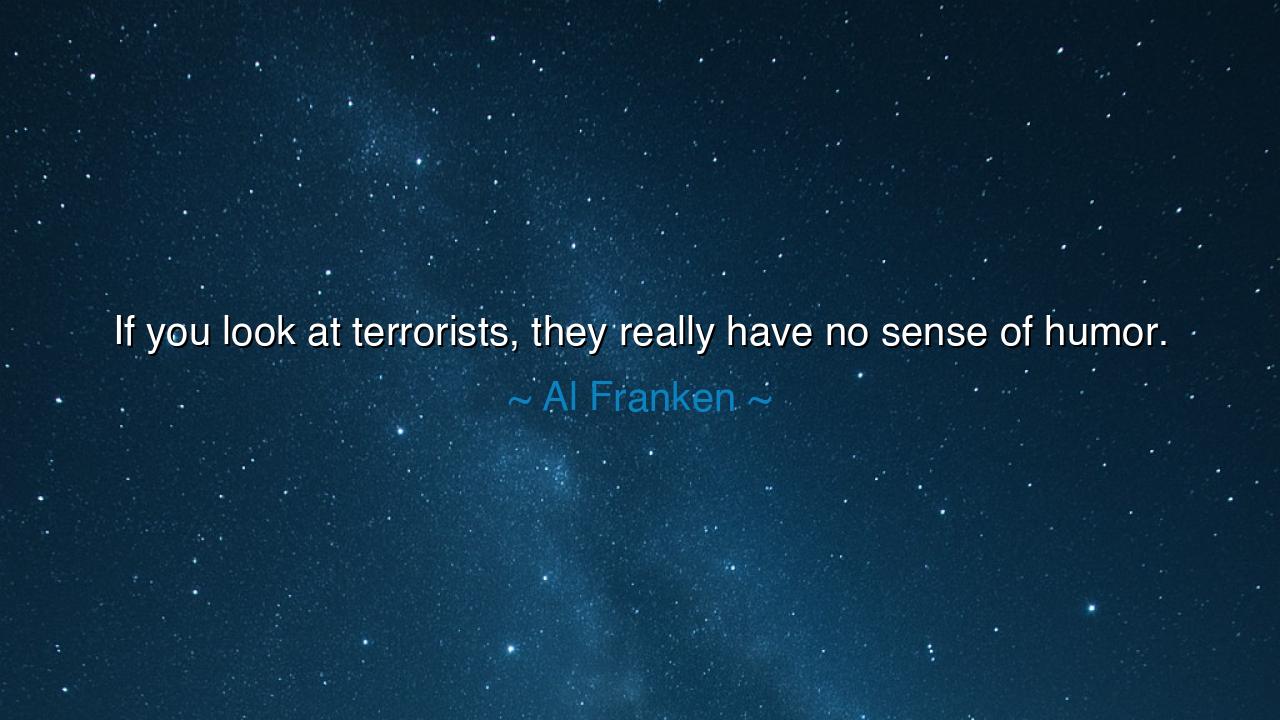
If you look at terrorists, they really have no sense of humor.






In the vast landscape of human conflict, where ideologies clash and ideologies breed hate, there are forces that would seek to strip us of our most sacred qualities—those that elevate us beyond mere survival. Al Franken, with his characteristic wit, once remarked, "If you look at terrorists, they really have no sense of humor." These words carry more weight than simple jest, for they touch on something deeper—the absence of humor in those who perpetuate violence, and the profound implications of living without the capacity to laugh, to reflect, or to understand the absurdities of existence. Franken's words are a reminder that humor is not just a trivial pursuit but a cornerstone of our humanity, a force that connects us to one another and to our better nature.
The ancients knew well the power of humor. Aristotle, in his exploration of the human condition, wrote of laughter as a reflection of our ability to recognize the incongruities of life. Humor, he said, arises from the collision of what we expect and what actually occurs. It is an expression of our awareness of the absurd nature of existence, and it is this awareness that distinguishes us from the brutal forces of the world. Terrorists, those who seek to impose fear and destruction, operate from a place of absolute seriousness—a seriousness that leaves no room for reflection, no space for laughter or self-examination. They are consumed by a vision of the world so rigid and distorted that humor—that essential force of connection—has no place in it.
The absence of humor in the lives of those who resort to violence and terror is not a coincidence but a reflection of a deeper spiritual and psychological imbalance. Socrates, in his time, often used humor to provoke thought and expose the contradictions within the hearts and minds of those around him. His famous dialogues were filled with irony, not to mock but to reveal the deeper truths hidden beneath layers of false certainty. In contrast, those who wield power through violence are too entrenched in their own narrow view of the world to allow for such reflection. Humor, in its truest form, is an act of freedom—a way of seeing the world without being enslaved by rigid belief or ideology. Terrorists, driven by an unyielding devotion to their cause, often find themselves trapped in an unrelenting seriousness, unable to step back, to laugh, or to see the absurdity in their own behavior.
The absence of humor is not only a mark of the terrorist, but also a sign of the tyrant throughout history. Genghis Khan, the infamous conqueror, ruled with fear and absolute authority, yet even he, in his moments of reflection, found solace in humor. There are tales of Genghis Khan sharing jokes with his warriors, moments of laughter that transcended the harshness of his reign. This suggests that even the most fearsome of men understood that laughter is a humanizing force, a force that bridges the gap between victor and vanquished, between ruler and subject. But where terrorism reigns, humor is often absent. The absence of humor signals an unwillingness to see beyond one’s own ideology, an inability to connect with others, to see them not as enemies, but as fellow human beings capable of both suffering and joy.
Franken's words also point to the irony of terror itself. Terrorists, in their pursuit of a world dominated by fear and obedience, fail to understand the power of humor as a weapon for peace. Laughter is a powerful force; it diffuses tension, it exposes the flaws in rigid ideologies, and it unites people across the divides of culture and belief. Consider the stories of Nelson Mandela, who, after enduring years of imprisonment, used humor as a means of bridging the gap between South Africa’s warring factions. Mandela's ability to laugh, even in the face of profound suffering, was not just a personal strength, but a tool of political and social transformation. It was through humor that he connected with his enemies, diffused their hostility, and laid the foundation for reconciliation. In this, humor is revealed not as a trivial pursuit, but as a profound weapon against division and hatred.
The lesson here is clear: humor is not merely an amusement, but a pathway to understanding, connection, and peace. To live without it is to live in a world of isolation and intolerance, where the absurdities of life are never recognized, and where human connection is lost. The terrorist, in his absence of humor, has lost the ability to see the humanity in others, to laugh at the contradictions of the world, and to embrace the lightness that is necessary to survive life’s most difficult moments. It is this absence that makes violence a possibility, for when we cannot laugh at ourselves or with each other, we are left with only the grip of anger and fear.
Thus, let us embrace the humor in our lives. Let us recognize that it is through laughter, through the ability to step back from our seriousness, that we begin to heal and to connect. Humor is a tool of peace, a weapon against the forces that would seek to divide and destroy. In moments of fear or uncertainty, let us choose laughter over violence, connection over division. Franken’s words remind us that when we laugh, we do not diminish the challenges before us; we transcend them. Laughter is not only a sign of joy, but a powerful statement that we will not be enslaved by the seriousness of life’s tragedies. We will face them with wisdom, lightness, and the shared strength of the human spirit.






AAdministratorAdministrator
Welcome, honored guests. Please leave a comment, we will respond soon